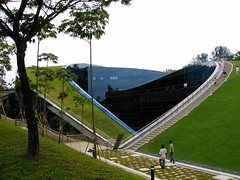
Earlier this month I was lucky enough to be invited to Singapore to present a series of guest lectures at Nanyang Technological University‘s (NTU) school of Arts, Design and Media (ADM). This department of NTU is rather similar in focus to Ravensbourne, where I run the BA (Hons) Web Media course. Although ADM is a little more arts oriented, and a little less commercial than Ravensbourne, the range of courses has quite a number of parallels, with interactive visual communications, animation, digital film, digital photography, and so on. I lectured to a varied group from different disciplines, including a number of NTU staff.
The lectures I gave were hung off the slightly opaque mantle of the “trans-social web”. I talked about the rise of social media, UGC and citizen journalism, participatory narratives, Internet meme culture, entrepreneurship and the lean startup, digital workflows, and the long tail. So pretty much all the headline themes that have defined the Internet age were covered. What struck me most of all, however, and seemed like the biggest revelation to the audience, was how startup culture operates. Singapore is a hugely successful state, with a rapidly growing population and a legendary ability to remain organised. But they don’t yet appear to have embraced the culture of small digital business ventures that is blossoming so rapidly in East London and Berlin, taking its lead from the US West Coast.
This was the third time I have visited Singapore, and each time it feels like a different place. When I went there over ten years ago, the country seemed to be focusing on arts and culture, with a newly constructed Esplanade – Theatres on the Bay arts centre culminating the 1990s programme to bring big-name performances to Singapore. But now the emphasis appears to have shifted, since the country has improved its standing in arts and culture to the level of a developed nation. I attended a small exhibition including both dissenting political voices and LBGT imagery, and there wasn’t really a feeling that this was anything that unusual anymore. According to the Times Higher Education supplement, the National University of Singapore is the 22nd most well reputed university in the world, with only Kyoto University in Japan above it from outside Europe and North America.
But chatting to a young lawyer about a music-related startup he was thinking about pursuing, it became clear that the support network for small businesses wasn’t as developed as it is in the US, Australia, and some parts of Europe. I did notice a seminar on entrepreneurship was being advertised at NTU a little after I was due to leave, though, and I wouldn’t be surprised if this area will be gaining real momentum by the next time I visit. All it needs is for the government to decide this is the next area that needs attention. From what I have seen in my previous brief visits, Singapore is a nation that decides to do something, then just gets on with it. After all, this is a country that can complete roadworks in a single night that would take the UK highways agency a few days just to put the cones down for.
Related Posts







